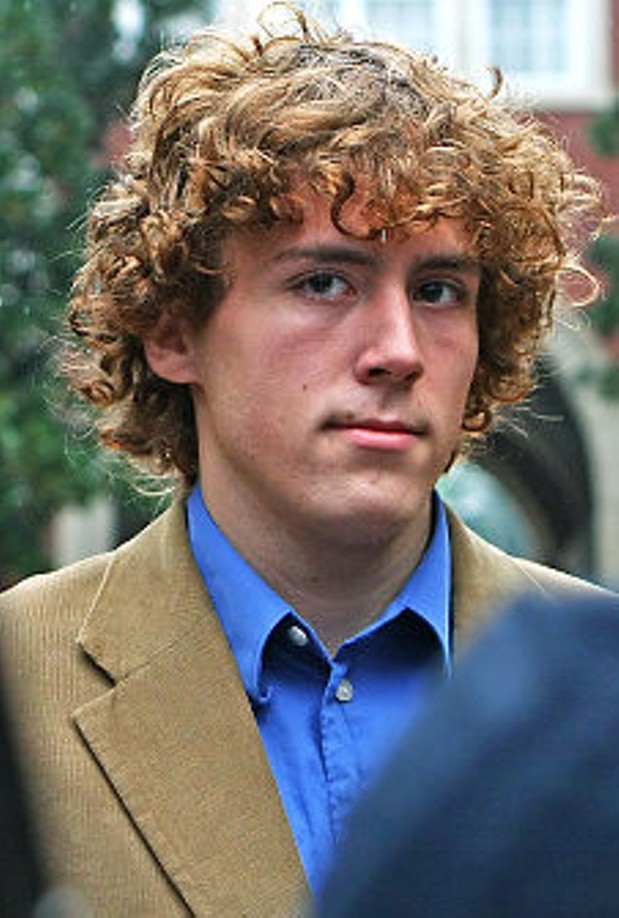
David Kernell at the time of his 2010 trial
David Kernell, whose father, Mike Kernell, is a School Board member and a moderate former Democratic state Representative and who, like his activist parents, was no political firebrand, died in California last weekend, more or less as a footnote to the 2008 presidential campaign and, in particular to the now stalled career of Republican vice presidential candidate Sarah Palin, who was — and is — regarded as the most unlikely and eccentric nominee for national office prior to the rise of Donald Trump.
The word “footnote” is a quite literal word choice, because, while Kernell, a young man of significant gifts and promise, who had just reached the age of 30, has a page in Wikipedia, that page consists of a single line which links to a longish article entitled “Sarah Palin Email Hack.”
Now that he is deceased — of natural causes related to multiple sclerosis — perhaps the proprietors of Wikipedia will be respectful enough to assign Kernell more space in his own right. While the “email hack” of Palin, which would earn him almost a year’s imprisonment, drew abundant publicity, both during the 2008 campaign and during the 2010 trial of young Kernell, then a University of Tennessee economics major, he had given evidence of being a truly round character with numerous roads to possible influence and success.
His quasi-Caesarian handle, “Rubico,” made (temporarily) famous because of the hack, was also used for Kernell’s online chess competitions, which would see him ranked among the top 10 percent of national players. While a student at Germantown High School he had won a state chess championship.
He had also developed skills as a naturalist, and after completing his degree at UT after serving his time at a minimum security prison applied his cybernetic abilities to the development of facial recognition software that could help identify children susceptible to abuse.
Palin herself, who in 2008 and at Kernell’s trial had likened the hack of her private email to the transgressions of Watergate, had mellowed to the point of contributing a sort of eulogy herself this week:
“I can not fathom losing a child, at any age, and can only imagine the sorrow,” Palin wrote on her Facebook page.. “I am so sorry for [the family’s] loss. As the Kernell family said, the 2008 incident does not define David. He went on to do good for his family and community. I would ask the public to let David’s good memory supersede anything else. My family and I pray that David’s family is enveloped in peace, knowing God has their son, awaiting a reunion someday.”
In today’s political environment of Wikileaks espionage, stolen emails and online misrepresentations, David Kernell’s offense in 2008 was a modest thing indeed — something, as his lawyer argued, closer to a “prank” than to a crime.
What he had done, essentially, was to guess Palin’s online password from publicly available biographical information, gone in out of curiosity, and published a few harmless odds and ends from her email correspondence on the imageboard 4chan, along with the new password he had devised for Palin’s email account once he’d hacked his way in.
The incident, while it technically made Kernell eligible for both felonies and misdemeanors, was a stunt that may have embarrassed Palin but caused neither her nor her campaign any permanent harm. It was nevertheless an invasion of privacy, and the fact that Kernell had attempted to erase evidence of the hack on his computer qualified as obstruction of justice and was the proximate reason for his year’s worth of prison time.
While David Kernell may have enjoyed, by his own statement at the time, a momentary high from the success of his hack, he never perpetrated anything directly malicious with it, and by all accounts, came to regret what he had done. He accepted his punishment and, as indicated, resolved thenceforth to use his gifts and ingenuity on behalf of society as a whole.
Hopefully, his amended Wikipedia page will come to recognize that fact, as his family and many friends and Sarah Palin herself do. His death leaves a palpable sense of loss.